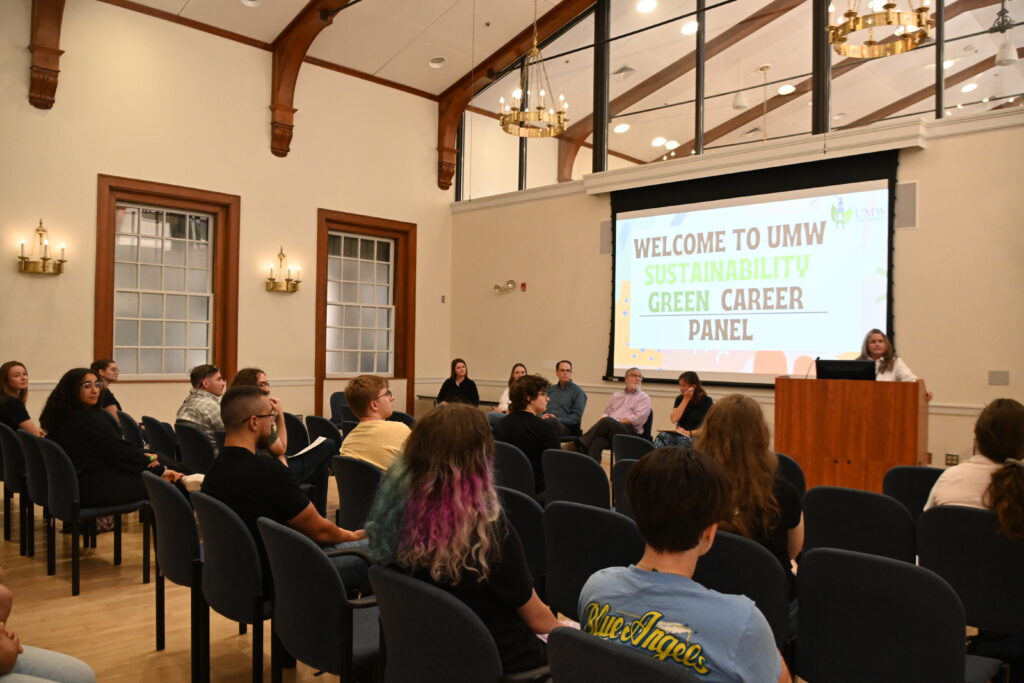Professors discuss environmental sustainability minor
4 min read
Professors from the Department of Earth and Environmental Sciences speak on upcoming course offerings related to environmental sustainability. | Abbey Magnet, The Weekly Ringer
by EMMA KINGKEO
News Editor
Starting next semester and continuing into the fall 2025 semester, the UMW Department of Earth and Environmental Sciences will offer several courses relevant to the environmental sustainability minor, including one that has not been taught since before the COVID-19 pandemic. On Nov. 6, professors and alumni convened for a panel discussion to outline the upcoming course offerings and emphasize the importance of sustainability education.
Next fall, Associate Professor of Earth and Environmental Sciences Melanie Szulczewski is bringing back “Sustainability Issues in South Africa”—a class that has not been taught at UMW for nearly five years. The course provides students with the opportunity to study abroad, as it is taught in tandem with a UMW Faculty-Led Program.
“We will go to South Africa for two weeks over winter break for hands-on learning about sustainability and conservation in the developing countries,” Szulczewski said.
Every fall semester, Professor of Biology Alan Griffith teaches “Conservation Biology,” an upper-level biology class that also familiarizes students with the law and the value of the environment. He says that the contents of the course apply to real-world careers in sustainability.
“At the end of the semester, my students also write a conservation management plan,” said Griffith. “That is a real practical experience that you get in that class that you could take in all kinds of different places if you were to go into sustainability, conservation kinds of areas.”
John Tippet is an adjunct professor of earth and environmental science and will be teaching a senior seminar course designed to provide students with the opportunity to address real-world issues about sustainability and prepare students for the workforce.
“I teach you that structured mechanism, that kind of thing you might use when working for an agency or maybe as a consultant and approaching environmental problems,” he said.
Tippet also teaches “Global Environmental Problems” and “Energy Resources and Technology” in the fall. “Global Environmental Problems” has students analyze the root causes of environmental issues, and “Energy Resources and Technology” seeks to build technical knowledge about the future of renewables.
As the program director of the environmental sustainability minor, Szulczewski wanted the program to be accessible to students interested in the field.
“I designed it to appeal to non-science majors, you could get away with getting the minor with only one lab class, but at least the other classes that are involved [include] the actual scientific principles that underlie the social and policy decisions that are often made,” she said.
This framing appeals to students majoring in various disciplines, even those outside of the traditional sciences or STEM departments. Junior environmental science major Eric Torres appreciates that the minor encompasses several aspects of sustainability and not just standard lab work.
“I think that some of the most interesting things were just the ideas of this holistic approach to environmental science, as opposed to this kind of, everybody thinks it’s all like nerds in the mud type thing, but it’s a lot more than that,” he said. “It’s policy, it’s law, it’s activism and organization. So there’s a lot of different ways that you can get involved.”
Mauri Deihr, an ecologist for Resource Environmental Solutions, LLC, and a UMW Class of 2021 alumna, pursued a career in sustainability after meeting Griffith during her senior year.
“It was really refreshing to hear that you can combine your passion with the realities of the world, especially with policy and law and all those things,” said Deihr.
She encourages students to form strong relationships with their professors, as they may become long-term mentors.
“When I was in my undergrad years, I was so focused on my labs and my grades that I didn’t pay attention to doing the networking that I really should have done,” said Deihr. “I didn’t form any super close relationships with my professors. If I could redo everything, I would do that.”
Tippet agreed that connections are crucial, especially with professors who have years of expertise and experience.
“If you connect with them and ask them about what they’re interested in, you’re going to immediately, all of a sudden, your educational experience can transform dramatically, just from putting yourself out there like that,” he said.
Maggie Hagtergy, a junior conservation biology major who attended the panel discussion, was happy to have heard from recent alumni in the field.
“It was good to get perspectives of newer graduates because a lot of things about the job market, especially in sustainability within the short term, are looking really scary right now,” she said. “So it was nice to hear from people who have just entered it and are succeeding right now.”
In relation to the uncertainty surrounding sustainability that Hagtergy mentions, just hours before the panel began, the results of the 2024 presidential election were projected. While the panelists agreed that the future of sustainability initiatives is uncertain, Tippet was able to provide his outlook.
“We learned last night that just voting doesn’t do it,” he said. “I think the lesson is, get organized. Because if we really want to change the course of things, power comes in numbers. I’ve seen that work. It’s been a big part of my career. I know it works, but that’s what it’s going to take.”


